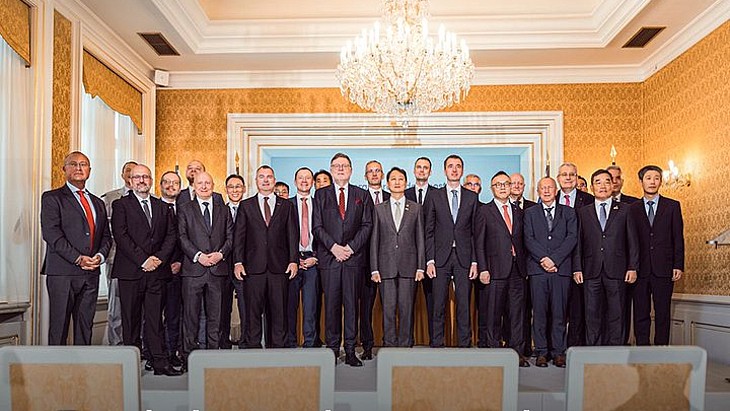The signing of the contracts and agreements between the firms came despite a court injunction secured by France's EDF on Tuesday which prohibited the signing of the contract for the new units with the Czech Republic's preferred bidder Korea Hydro & Nuclear Power.
Czech Minister of Trade and Industry, Lukas Vlcek, said: "At this point, it is important that we do everything we can to continue immediately after the court's decision. That is why a number of commercial agreements and cooperation agreements between KHNP and other members of the Korean team were signed today.
"The signing of contracts is clear proof that we are serious about the construction of new nuclear units. Nine contracts on future contracts and three memoranda were signed, confirming the readiness of the project and the specific involvement of Czech companies, 30% to date, 60% by the end of construction.
"These include a framework agreement on the supply of a turbine hall and a contract for a steam turbine between Škoda Power, KHNP and Doosan. Other significant agreements were concluded with Škoda JS, ÚJV Řež, Metrostav DIZ, ZAT, OSC, I&C Energo, NUVIA and the Association of Construction Entrepreneurs.
"Thirty percent involvement of Czech industry in the construction is already ensured today - and the goal remains sixty percent. We have chosen the best possible partner. The Dukovany project is strategic from the point of view of energy, safety and industry. And we are ready to continue the construction process as soon as possible."
The country's nuclear power plant operator CEZ, whose Elektrárna Dukovany II project company conducted the tender process which recommended the Korea Hydro & Nuclear Power (KHNP) bid, posted a group photo on the X social media site and said: "The construction of new nuclear units in Dukovany is a crucial project for Czech energy security and self-sufficiency. Czech households and the Czech economy must be sure that there will be enough energy available at affordable prices to maintain quality of life, prosperity and the competitiveness of Czech industry."
The tender process
The Czech Republic currently gets about one-third of its electricity from the four VVER-440 units at Dukovany, which began operating between 1985 and 1987, and the two VVER-1000 units in operation at Temelín, which came into operation in 2000 and 2002.
In October 2023, Westinghouse, EDF and KHNP submitted binding bids for a fifth unit at the Dukovany nuclear power plant, and non-binding offers for up to three more units - another one at Dukovany and two at the Temelin nuclear power plant. Westinghouse was proposing its AP1000, EDF was proposing its EPR1200 reactor, KHNP was proposing its APR1000. But in February 2024 the Czech government announced it was changing the tender to be binding offers for four new units, with Westinghouse not included because it "did not meet the necessary conditions".
Prime Minister Petr Fiala explained at the time that the decision to switch to binding offers for all four units was the result of the original tender suggesting that contracting for four units, rather than having separate processes, could have a 25% benefit in terms of costs.
In July, he announced KHNP as the preferred bidder, with contract negotiations to begin with the aim of signing contracts for the initial unit by the end of March 2025 - the target for test operation of the first new unit is 2036 with commercial operation in 2038. He said the winning tender "based on the evaluation of experts, offered better conditions in most of the evaluated criteria, including the price". The KHNP bid was for a cost of around CZK200 billion (USD8.6 billion) per unit, if two units were contracted.
The legal challenge
The March contract signing target was missed after both EDF and Westinghouse appealed to the Czech Republic's competition authorities about the selection process - Westinghouse later withdrew its appeal. EDF's case was rejected by the competition watchdog two weeks ago. That had cleared the way for the contract with KHNP for the first unit to be signed on Wednesday 7 May. But with the South Korean delegation already travelling to the Czech Republic, EDF succeeded on Tuesday in getting a regional court injunction to prohibit the signing of the contract.
The regional court said the injunction, which lasts until EDF's case challenging the process used to select the South Korean firm is heard in full, was issued because of the "serious harm that the plaintiff (EDF) is threatened with ... if the contract were concluded the French bidder would irretrievably lose the opportunity to obtain the public contract, even if the court ruled in its favour in the lawsuit".
Following the regional court's decision on Tuesday, Czech Prime Minister Petr Fiala issued a short statement on social media saying: "We take note of the independent court's decision. We are convinced that the process of evaluating bids was conducted fairly and in accordance with applicable laws. In selecting the supplier, the key factors were the availability of reasonably priced electricity for citizens and businesses, as well as the best guarantees. I believe that the court is aware of all the contexts and risks and will decide quickly."
On Wednesday KHNP issued a statement saying that it would "respect the Czech legal procedures and faithfully comply with all related laws and regulations" but believes the bidding process "was conducted fairly, transparently, and legally" and it was "very sorry about the competitor’s continued attempts to undermine the bidding results".
Last week it was announced that the Czech state - which already owns 70% of CEZ - was going to purchase 80% of shares in the Elektrárna Dukovany II project, with CEZ retaining a 20% stake. The 80% stake was valued at CZK3.6 billion (USD163 million).
Article researched and written by WNN's Alex Hunt





_23009.jpg)

_33392.jpg)
_53504.jpg)






